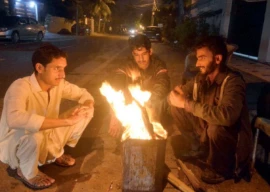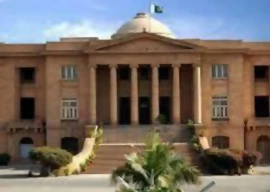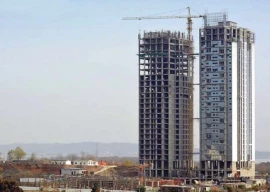
“It was like that,” he replies in an attempt to describe the flooding.
On Eid day, students and faculty from the Department of Visual Studies of the University of Karachi decided to spend time with flood survivors at this camp. It has been set up by the Karachi Social Forum under the leadership of Afaq Bhatti, a quiet, kind young man, who spends all his waking hours gathering tents, food and clothing. The camp is well organised with about 300 tents contributed by private donors. The residents are mostly from Jacobabad, Shahdadkot, Shikarpur and Khairpur. They are shopkeepers, teachers, masons, living side by side with farmers and labourers in an orderly and dignified fashion.
A KU bus loaded with students, teachers and friends of the department, another half a dozen cars of those who could not fit in the bus came to spend Eid afternoon at the camp, armed with cricket bats, kites, toys, henna cones, snacks and guitars.
When we arrived, we were thrown off because it had been raining for two days and the camp was muddy. Everyone looked depressed because all of their scant belongings were wet, the floors of their camps were slush and some tents had collapsed. A few downcast people said the floods were following them and there seemed to be no escape.
Students quickly divided into groups and started walking through the organised lanes. Before long, I saw some of them re-erecting fallen tents, digging piles of earth to raise the floors of flooded tents and building small embankments around them. The men who had just been sitting in despair started helping. Quietly, a few female students had begun applying henna. Soon the mood started lifting. The rain stopped.
After the first hour, I started to hear strands of music from the guitars and the youngest children started singing. One of the students had brought her flute and accompanied the “band”. Soon the older boys and then the men joined the audience. Some of the children were persuaded to dance. Close by a cricket game had begun and soon, everyone was smiling. The rest of us were quietly distributing balloons, snacks, toys and some clothes tent by tent. The toys were collected in one day by students of St Joseph’s Convent. Saeed Bhai, who considers himself poor, handed out Rs500 worth of crisp five-rupee notes, Eidi collected by his daughters.
The first person I visited immediately invited me in to her tent for a cup of hot tea. Sadura is in her ninth month of pregnancy and looked ready to deliver. She has been spending the nights on the earth without even a chador. Afaq Bhatti has arranged an ambulance. We gave her a heavy chador, acutely aware of the inadequacy of this gesture, and with a promise to ourselves to get her a cot for the baby and a bed for her. Two babies were born last week, and one shortly after our visit. I wonder if it was hers.
Amir Zadi (the irony of her name did not escape us) is living in one tent with her husband Yar Mohammed, her mother-in-law, two daughters and two sons. She is keen to see a doctor and wants shoes for herself and her children as the camp has scorpions and snakes.
The camp has the advantage of being secluded, clean and airy. There is a water supply. However, at night it is pitch black with no electricity or streetlighting. There are bathrooms but the women find it nerve racking to go at night. There are tents but not enough beds. Many sleep on the floor and there is an urgent need for beds and blankets. There is a good breeze but it also lifts up the flimsy tents and leaves little privacy.
A charitable trust delivers food. A taxi driver has offered his help for emergencies and transport, taking only the cost of petrol. Over the next few months, we hope to build in-house cooking facilities, sturdier shelters, an area for a school, get solar lamps, establish a craft centre for the women, many of who make patchwork quilts or rillis and embroider, and encourage the men to grow vegetables. Hamza Vora and Tobias Ottahal, who have come from Vancouver for a craft development residency at KU, intend to focus on economic rehabilitation. A team from SIUT, including Dr Aamir Jaffrey and Dr Riffat Zaman, plan weekly clinics.
We left to the sound of children trumpeting party blowers from every corner of the camp. The floods should perhaps not simply be seen as a tragedy, but an opportunity. The waters may have swept away homes but it has also revealed the potential to cleanse away social stagnation. Urban Pakistan has come to know rural Pakistan. For once, we, the ordinary citizens, feel we have a role to play.
Durriya Kazi is the chairperson of the department of Visual Studies at the University of Karachi
Published in The Express Tribune, September 15th, 2010.
1729161093-0/liam-(4)1729161093-0-405x300.webp)
















COMMENTS (4)
Comments are moderated and generally will be posted if they are on-topic and not abusive.
For more information, please see our Comments FAQ